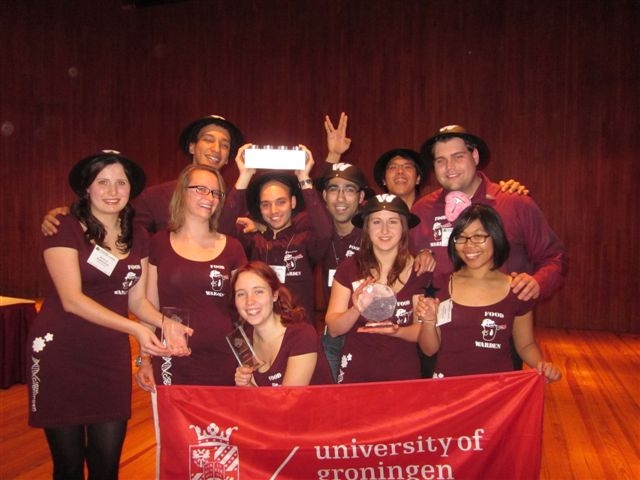Groningen iGEM team is world champion

A team of 11 University of Groningen Master’s students became world champion in the international iGEM competition in Boston last Monday. It’s a magnificent victory because the team also won virtually all the other prizes available at this annual competition.
The aim of the competition, the World Championship in Synthetic Biology, is to use biotechnology to build a designer bacterium that can perform a useful task. The competition has preliminary rounds on each continent and a final at MIT in Boston. Last month the Groningen team became European champion.
Sixty-five teams competed in the final, including top universities like MIT, Harvard, Yale, Cambridge, UCL, Stanford, Munich, Paris, Peking, Shanghai and Tokyo. The Groningen team won not only the main prize, but also prizes for best presentation, best poster and best Food & Energy Application.
Team Groningen thought up a biological detection system to check how fresh meat is. They designed and ‘built’ a bacterium that changes colour as the meat goes off. The complete system comprises a sticker that you can put on meat at home to check whether it is still fresh. The colour-change bacteria are safely packaged in a special film which allows volatile substances from the meat to permeate but is completely impermeable for liquids and other bacteria. The system is very sensitive and reacts long before a person could smell anything suspicious.
The students have worked long and hard on the project. They started in April and only knew at the end of September that their system actually worked. They hope that the freshness sensor will really be put to use in the future and contribute to consumers throwing less food away.
See also:
- UniFocus, Students make freshness sensor
- iGEM competition
| Last modified: | 13 October 2022 08.44 a.m. |
More news
-
03 April 2025
IMChip and MimeCure in top 10 of the national Academic Startup Competition
Prof. Tamalika Banerjee’s startup IMChip and Prof. Erik Frijlink and Dr. Luke van der Koog’s startup MimeCure have made it into the top 10 of the national Academic Startup Competition.
-
01 April 2025
NSC’s electoral reform plan may have unwanted consequences
The new voting system, proposed by minister Uitermark, could jeopardize the fundamental principle of proportional representation, says Davide Grossi, Professor of Collective Decision Making and Computation at the University of Groningen
-
01 April 2025
'Diversity leads to better science'
In addition to her biological research on ageing, Hannah Dugdale also studies disparities relating to diversity in science. Thanks to the latter, she is one of the two 2024 laureates of the Athena Award, an NWO prize for successful and inspiring...
